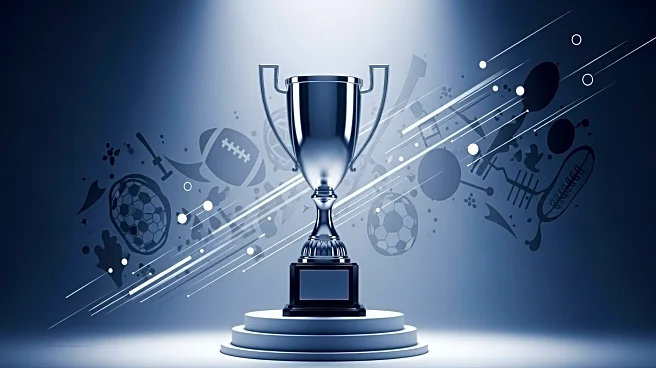What's Happening?
French sports authorities have declared that any French athlete participating in the Enhanced Games will face sanctions. This announcement follows the decision of suspended sprinter Mouhamadou Fall to
join the startup Olympic-style sports venture, which allows athletes to use performance enhancers and promises no drug testing. The Enhanced Games, set to debut in May in Las Vegas, will feature swimming, track, and weightlifting competitions. Fall, who has won several national titles in the 100 and 200 meters between 2019 and 2023, has not been licensed with the French track and field federation since 2023 due to consecutive anti-doping rule violations. The French ministry of sports, the French Olympic committee, and the French Anti-Doping Agency (AFLD) have issued a joint statement emphasizing the potential health risks and the distortion of athletic achievement posed by the Enhanced Games.
Why It's Important?
The decision by French sports authorities to sanction athletes participating in the Enhanced Games highlights the ongoing global debate over doping in sports. The Enhanced Games' approach, which encourages the use of performance-enhancing drugs, challenges traditional views on sporting integrity and athlete health. This development could have significant implications for international sports governance and the future of competitive sports. It raises ethical questions about the balance between pushing human limits and maintaining fair play. The potential emergence of institutionalized doping could undermine efforts to promote clean sports and protect athletes' health, leading to broader discussions on regulatory measures and the role of private entities in sports.
What's Next?
The AFLD plans to conduct testing ahead of the Enhanced Games on any French athlete intending to participate, enforcing penalties for banned substances. As the event approaches, there may be increased scrutiny and debate over the legitimacy and safety of the Enhanced Games. Stakeholders, including international sports organizations and health advocates, are likely to weigh in on the implications of allowing performance enhancers in competitive sports. The response from other countries and sports bodies could influence the future of such events and the broader conversation on doping policies.
Beyond the Headlines
The Enhanced Games could signal a shift in how sports are perceived, potentially leading to a division between traditional competitions and those that embrace performance enhancers. This development may prompt discussions on the cultural and ethical dimensions of sports, questioning the values that underpin athletic achievement. The long-term impact could include changes in sponsorship, media coverage, and public perception of athletes who choose to compete in such events.










